
International Journal of Semantic Computing
Scope & Guideline
Fostering Interdisciplinary Collaboration in AI and Linguistics
Introduction
Aims and Scopes
- Semantic Technologies and Knowledge Representation:
The journal emphasizes the development and application of semantic technologies, including knowledge graphs, ontologies, and semantic networks, to facilitate better data understanding and interoperability. - Artificial Intelligence and Machine Learning:
A core area of focus is the application of AI and machine learning techniques to enhance semantic computing, including natural language processing, computer vision, and reinforcement learning. - Transdisciplinary Approaches:
The journal encourages research that bridges multiple disciplines, such as healthcare, robotics, and environmental studies, using semantic computing as a foundational tool. - Real-World Applications:
There is a consistent focus on practical applications of semantic computing in various sectors, including smart cities, healthcare, and multimedia processing, demonstrating the technology's impact on real-world challenges. - Innovative Algorithms and Methodologies:
The journal showcases innovative algorithms and methodologies that advance the field of semantic computing, including deep learning architectures and graph-based learning techniques.
Trending and Emerging
- Generative AI and Large Language Models (LLMs):
With the rise of LLMs, there is a growing focus on their capabilities, limitations, and potential applications, indicating a significant shift in how researchers approach natural language processing. - Transdisciplinary AI Applications:
Research is increasingly oriented towards transdisciplinary applications of AI, particularly in sectors like healthcare and environmental science, showcasing the versatility of semantic computing. - Real-Time Data Processing and Analysis:
There is an emerging trend toward methodologies that support real-time data processing and analysis, particularly in contexts like live video streaming and dynamic sensor data. - Explainable AI and Trustworthy Systems:
An increasing number of papers address the need for explainability and transparency in AI systems, reflecting a growing concern for ethical considerations and user trust in AI technologies. - Advanced Graph-Based Techniques:
Graph neural networks and other graph-based methodologies are gaining traction as researchers explore their potential in various applications, including image classification and knowledge graph construction.
Declining or Waning
- Traditional Rule-Based Systems:
Research on traditional rule-based systems has decreased as newer, more dynamic AI approaches gain traction. This shift reflects a broader trend towards machine learning and data-driven methodologies. - Basic Ontology Development:
The emphasis on developing basic ontologies without application context is waning. Researchers are now prioritizing ontologies that are integrated with advanced AI techniques and real-world applications. - Single-Domain Applications:
There is a noticeable decline in studies focused solely on single-domain applications of semantic computing. Instead, interdisciplinary and transdisciplinary studies are becoming more prevalent. - Static Data Integration Techniques:
As the field evolves, static approaches to data integration are less favored compared to dynamic, context-aware systems that leverage real-time data and machine learning.
Similar Journals

AUTOMATIC DOCUMENTATION AND MATHEMATICAL LINGUISTICS
Integrating mathematical techniques for groundbreaking linguistic insights.AUTOMATIC DOCUMENTATION AND MATHEMATICAL LINGUISTICS is a leading journal published by PLEIADES PUBLISHING INC, dedicated to advancing the field of linguistics through the rigorous application of mathematical techniques and automated methodologies. With an ISSN of 0005-1055 and an E-ISSN of 1934-8371, this journal provides a critical platform for researchers and professionals interested in the intersection of language processing and computational analysis. Although it does not currently offer open access options, it remains a pivotal resource within the academic community. Its high scholarly standards and commitment to excellence ensure that published articles contribute meaningfully to the discourse on automatic documentation and mathematical linguistics, making it an essential read for academics, students, and practitioners alike. Explore a wealth of knowledge that reflects contemporary developments and future directions in this vital area of study.

Journal of Sensor and Actuator Networks
Advancing sensor technology for a connected future.Journal of Sensor and Actuator Networks is a premier open-access journal published by MDPI, dedicated to advancing the field of sensor and actuator technology since its inception in 2012. With a commitment to disseminating cutting-edge research, the journal offers a platform for articles that explore the latest innovations and applications in the realms of computer networks and communications, control and optimization, and instrumentation. It proudly holds a prestigious Q1 ranking in instrumentation and Q2 rankings in both computer networks and control and optimization as of 2023, emphasizing its significant impact within these domains. The journal is indexed in Scopus and is recognized for its high-quality contributions, with impressive rankings including 9th in control and optimization and 19th in instrumentation. Researchers, professionals, and students seeking to stay at the forefront of sensor and actuator technologies will find a wealth of insightful articles and studies within its pages. As an open-access journal, it ensures that knowledge is widely accessible, fostering collaboration and innovation across the global scientific community. For more information, the journal is based in Basel, Switzerland, situated at ST ALBAN-ANLAGE 66, CH-4052 BASEL, SWITZERLAND.
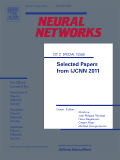
NEURAL NETWORKS
Pioneering Research at the Intersection of Mind and MachineNEURAL NETWORKS, an esteemed journal with the ISSN 0893-6080 and E-ISSN 1879-2782, is published by Pergamon-Elsevier Science Ltd in the United Kingdom. This influential journal, established in 1988 and continuing its publication through 2024, is recognized for its significant contributions to the fields of Artificial Intelligence and Cognitive Neuroscience, ranking in the Q1 category in both disciplines as of 2023. With a strong Scopus rank of #4/115 in Cognitive Neuroscience and #35/350 in Artificial Intelligence, and a commendable percentile of 96th and 90th respectively, NEURAL NETWORKS stands at the forefront of academic research. Researchers, professionals, and students can benefit from the journal's rigorous peer-review process and the dissemination of groundbreaking findings that shape understanding in artificial intelligence methodologies and their cognitive applications. While the journal currently operates under traditional access options, it serves as a vital resource in fostering innovations and cross-disciplinary collaboration.
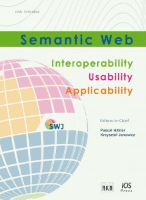
Semantic Web
Advancing the Future of Semantic TechnologiesSemantic Web is a leading scholarly journal dedicated to the advancement of research in the area of semantic web technologies and their applications. Published by IOS PRESS, the journal has established itself as a vital resource for scholars and practitioners since its inception in 2010, with a continued focus on fostering interdisciplinary collaboration through its publication of pioneering research in Computer Networks and Communications, Computer Science Applications, and Information Systems. The journal currently holds a prestigious Q2 ranking across these categories and is indexed in Scopus, reflecting its strong academic impact with rankings in the top 20% of its field. Although the journal operates under a subscription model, it remains committed to disseminating high-quality research that addresses contemporary issues in the semantic web domain. As the field continues to evolve, Semantic Web seeks to facilitate innovation, collaboration, and the development of standards, making it an essential outlet for researchers, professionals, and students keen on exploring the transformative potential of semantic technologies.

NEW GENERATION COMPUTING
Pioneering Research in Hardware and Software EngineeringNEW GENERATION COMPUTING is a prominent academic journal published by SPRINGER, specializing in the dynamic fields of Computer Networks, Hardware and Architecture, Software Engineering, and Theoretical Computer Science. With a commitment to disseminating high-quality research since its inception in 1983 and extending its coverage to 2024, this journal occupies a vital role in advancing knowledge and innovation within these critical domains. Holding prestigious Q2 rankings in Computer Networks and Communications, Hardware and Architecture, and Software, as well as a Q3 ranking in Theoretical Computer Science for 2023, NEW GENERATION COMPUTING attracts significant contributions from scholars and professionals around the globe. Researchers will find its rigorous peer-review process ensures the publication of impactful studies, while students gain access to cutting-edge research that shapes contemporary computing practices. Though it does not offer open access, the journal remains an invaluable resource in the academic community, fostering collaboration and dialogue among experts aiming to push the boundaries of technology.

Journal of Logic Language and Information
Navigating the Complexities of Language through LogicThe Journal of Logic Language and Information, published by SPRINGER, stands as a leading interdisciplinary platform dedicated to the exploration of the interconnections between logic, language, and information theory. With a history spanning from 1992 to 2024, this esteemed journal provides a vital forum for researchers, professionals, and students in fields such as Computer Science, Linguistics, and Philosophy. Notably recognized in the 2023 rankings, it holds a Q2 quartile in Computer Science (miscellaneous) and Q1 quartiles in both Linguistics and Language, and Philosophy, reflecting its high academic quality and relevance. Despite its nuanced focus, the journal's diverse scope attracts a global readership, encouraging innovative research and critical discourse. Although it is not an Open Access publication, the Journal's valuable contributions can be accessed through various institutional subscriptions, ensuring that its scholarly output remains influential within the academic community.
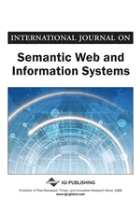
International Journal on Semantic Web and Information Systems
Advancing the Frontiers of Semantic Web Research.International Journal on Semantic Web and Information Systems, published by IGI Global, stands as a premier outlet for research in the realm of Semantic Web technologies and information systems. With a commitment to advancing knowledge and innovation, the journal is recognized for its influential contributions, evident from its prestigious Q1 rankings in both Computer Networks and Communications and Information Systems categories as of 2023. Catering to the high demands of the academic community, the journal provides a platform for interdisciplinary dialogue, showcasing cutting-edge research, methodologies, and applications that underpin the evolving landscape of information systems. Researchers and professionals can stay informed about the latest trends, best practices, and transformative technologies shaping the Semantic Web. Although it does not offer open access, the journal maintains rigorous peer-review standards to ensure quality and relevance, making it an essential resource for anyone dedicated to pushing the boundaries of knowledge in this dynamic field.

Acta Cybernetica
Cultivating Knowledge in the Evolving Landscape of Cybernetics.Acta Cybernetica, published by the University of Szeged, Faculty of Science, serves as a vital platform for researchers and practitioners in the fields of computational theory, computer science, and engineering. With an ISSN and E-ISSN of 0324-721X, this Hungarian journal has been disseminating valuable research since 1990 and is projected to continue through 2024. Although it currently holds a Q4 ranking in multiple categories—including computational theory, computer vision, and theoretical computer science—its impact lies in fostering innovative research discussions and multidisciplinary collaborations. Scholars in its specialized fields will find a wealth of insights that contribute to emerging trends and developments. While Acta Cybernetica is not an open-access journal, it remains an essential resource for advancing knowledge and practices within its academic community.
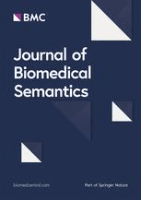
Journal of Biomedical Semantics
Bridging Health and Technology with Semantic ClarityThe Journal of Biomedical Semantics is a prestigious open-access journal published by BMC since 2010, dedicated to advancing the field of biomedical informatics through the lens of semantics. With an ISSN of 2041-1480, this journal caters to an international audience from its base in the United Kingdom. It focuses on the convergence of computer science, health informatics, and information systems, providing a vital platform for innovative research and knowledge dissemination. The journal is ranked in the second and third quartiles across several relevant categories in 2023, including Q2 in Computer Networks and Communications and Q3 in both Computer Science Applications and Health Informatics. With Scopus rankings highlighting its relevance in various subfields, this journal serves as a critical resource for researchers, professionals, and students alike, promoting high-quality, peer-reviewed articles on topics encompassing advanced computational methods and semantic technologies in healthcare. As a fully open-access resource, it ensures broad accessibility of groundbreaking research findings, making vital contributions to the ever-evolving landscape of biomedical semantics.
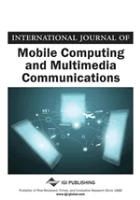
International Journal of Mobile Computing and Multimedia Communications
Connecting Ideas, Transforming TechnologiesThe International Journal of Mobile Computing and Multimedia Communications, published by IGI Global, stands at the intersection of technology and connectivity, addressing the critical advancements in mobile computing and multimedia communications. With an ISSN of 1937-9412, this journal provides a platform for the dissemination of innovative research findings and insights, fostering collaboration and communication among researchers, professionals, and students within the field. Although currently indexed in the Q4 quartile for 2023 in Computer Networks and Communications, its rich archive of articles from 2009 to 2014 and 2016 to 2024 reflects the journal's ongoing commitment to exploring emerging trends, technologies, and methodologies that shape the future of mobile computing. While it is not an open-access journal, the high-quality research published here is crucial for advancing academic discourse and practical applications in an increasingly digital world. By encouraging submissions across a wide range of topics, International Journal of Mobile Computing and Multimedia Communications continues to enhance its reputation as a pivotal resource for scholars and industry experts alike.